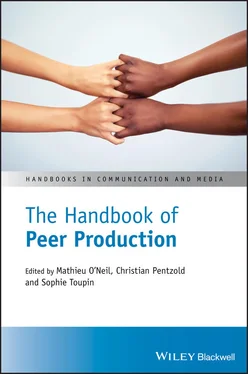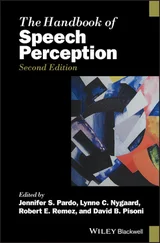The Handbook of Peer Production
Здесь есть возможность читать онлайн «The Handbook of Peer Production» — ознакомительный отрывок электронной книги совершенно бесплатно, а после прочтения отрывка купить полную версию. В некоторых случаях можно слушать аудио, скачать через торрент в формате fb2 и присутствует краткое содержание. Жанр: unrecognised, на английском языке. Описание произведения, (предисловие) а так же отзывы посетителей доступны на портале библиотеки ЛибКат.
- Название:The Handbook of Peer Production
- Автор:
- Жанр:
- Год:неизвестен
- ISBN:нет данных
- Рейтинг книги:5 / 5. Голосов: 1
-
Избранное:Добавить в избранное
- Отзывы:
-
Ваша оценка:
The Handbook of Peer Production: краткое содержание, описание и аннотация
Предлагаем к чтению аннотацию, описание, краткое содержание или предисловие (зависит от того, что написал сам автор книги «The Handbook of Peer Production»). Если вы не нашли необходимую информацию о книге — напишите в комментариях, мы постараемся отыскать её.
outlines central concepts, examines current and emerging areas of application, and analyzes the forms and principles of cooperation that continue to impact multiple areas of production and sociality.
Featuring contributions from an international team of experts in the field, this landmark work maps the origins and manifestations of peer production, discusses the factors and conditions that are enabling, advancing, and co-opting peer production, and considers its current impact and potential consequences for the social order. Detailed chapters address the governance, political economy, and cultures of peer production, user motivations, social rules and norms, the role of peer production in social change and activism, and much more. Filling a gap in available literature as the only extensive overview of peer production’s modes of generating informational goods and services, this groundbreaking volume:
Offers accessible, up-to-date information to both specialists and non-specialists across academia, industry, journalism, and public advocacy Includes interviews with leading practitioners discussing the future of peer production Discusses the history, traditions, key debates, and pioneers of peer production Explores technologies for peer production, openness and licensing, peer learning, open design and manufacturing, and free and open-source software
is an indispensable resource for students, instructors, researchers, and professionals working in fields including communication studies, science and technology studies, sociology, and management studies, as well as those interested in the network information economy, the public domain, and new forms of organization and networking.


![О Генри - Справочник Гименея [The Handbook of Hymen]](/books/407356/o-genri-spravochnik-gimeneya-the-handbook-of-hymen-thumb.webp)









